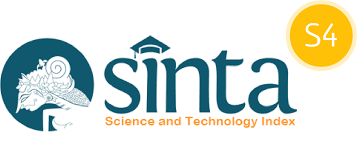Implementasi Algoritma Naive Bayes Untuk Klasifikasi Penerima Beasiswa (Studi Kasus Universitas Hamzanwadi)
DOI:
https://doi.org/10.29408/jit.v6i1.7529Keywords:
AUC, Beasiswa KIP/K, CRIS-DM, Cross Validation, Excellent classification, Naive Bayes clasifierAbstract
Every year the University offers various types of scholarships to its students, including Hamzanwadi Selong University, East Lombok. One type of scholarship offered is the Bidikmisi scholarship (KIP/K) which is intended for students who have middle to lower economic levels but have good academic achievement or potential. Every year the number of applicants for this scholarship continues to increase, but the number received each year is limited. The large number of piles of files applying for scholarships and the manual selection process tends to be ineffective and efficient and the results of the selection are inaccurate, so a system is needed that is able to assist in the selection process quickly, easily and on target. The method used is CRIS-DM with the Naive Bayes Classifier algorithm modeling, this method is an approach that refers to the Bayes theorem which combines previous knowledge with new knowledge. The variables consist of 7 attributes, namely: Name, DTKS status, achievement, parents' occupation, total income of parents, home ownership, and number of family dependents[1]. Testing was carried out using k-fold cross validation, and the highest accuracy results were obtained from k-fold 4 of 91.43%, while the AUC was 0.996% with a very good diagnostic classification. Thus it can be interpreted that the Naive Bayes algorithm is very well used in the selection of scholarships for bidikmisi scholarships at Hamzanwadi University
References
P. A. Ani and A. Andri, “Penerapan Algoritma Naive Bayes Untuk Klasifikasi Mahasiswa Penerima Kip Pada Universitas Bina Darma,” Bina Darma Conf. …, pp. 172–180, 2022, [Online]. Available: https://conference.binadarma.ac.id/index.php/BDCCS/article/view/3045%0Ahttps://conference.binadarma.ac.id/index.php/BDCCS/article/download/3045/1286
Y. Farida and N. Ulinnuha, “Klasifikasi Mahasiswa Penerima Program Beasiswa Bidik Misi Menggunakan Naive Bayes,” Syst. Inf. Syst. Informatics J., vol. 4, no. 1, pp. 17–22, 2018, doi: 10.29080/systemic.v4i1.317.
D. Dahri, F. Agus, and D. M. Khairina, “Metode Naive Bayes Untuk Penentuan Penerima Beasiswa Bidikmisi Universitas Mulawarman,” Inform. Mulawarman J. Ilm. Ilmu Komput., vol. 11, no. 2, p. 29, 2016, doi: 10.30872/jim.v11i2.211.
A. Rahman and A. Suryanto, “Implementasi Sistem Informasi Seleksi Penerima Beasiswa Dengan Metode Naive Bayes Classifier,” J. Penelit. Pendidik. Indones., vol. 2, no. 3, pp. 1–8, 2017, [Online]. Available: http://www.i-rpp.com/index.php/jpp/article/view/807
C. A. P. Dita, P. Chairunisyah, and ..., “Penerapan Naive Bayesian Classifier Dalam Penyeleksian Beasiswa PPA,” J. Comput. …, vol. 2, no. 2, pp. 194–198, 2021, [Online]. Available: https://ejurnal.seminar-id.com/index.php/josyc/article/view/649
G. Suganda, M. Asfi, R. T. Subagio, and R. P. Kusuma, “Beasiswa Kartu Indonesia Pintar ( Kip ) Kuliah Menggunakan Naïve,” vol. 9, no. 2, pp. 193–199, 2022, doi: 10.30656/jsii.v9i2.4376.
S. Iskandar, N. R. Refisis, and B. A. Ginting, “Metode Naive Bayes Classifer Dalam Penentuan Penerima Beasiswa Bidikmisi Di Universitas Negeri Medan,” Karismatika, vol. 7, no. 1, pp. 10–23, 2021.
Y. Yahya and H. Bahtiar, “Pengaruh Pertumbuhan Ekonomi Terhadap Tingkat Kesejahteraan Masyarakat Kecamatan Selong Kabupaten Lombok Timur – Nusa Tenggara Barat Menggunakan Algoritma Naive Bayes,” Infotek J. Inform. dan Teknol., vol. 4, no. 1, pp. 20–28, 2021, doi: 10.29408/jit.v4i1.2981.
I. Pangaribuan, “Penerapan Algoritma Naive Bayes Untuk Seleksi Beasiswa Pemprov Dan Bawaku Di Universitas Komputer Indonesia Application of Naive Bayes Algorithm for Selection of Providing and Bawaku Scholarship in University Computer Indonesia,” 2019.
R. A. Saputra and S. Ayuningtias, “Penerapan Algoritma Naive Bayes Untuk Penentuan Calon Penerima Beasiswa Pada Smk Pasim Plus Sukabumi,” Swabumi, vol. IV, no. 2, pp. 114–120, 2016.
Y. T. U. Heni Sulistiani, “Penerapan Algoritma Klasifikasi Sebagai Pendukung Keputusan Pemberian Beasiswa Mahasiswa,” Snti, pp. 300–305, 2018.
M. Saiful and S. Samsuddin, “Implementasi Algoritma Naive Bayes Untuk Memprediksi Predikat Ketuntasan Belajar Siswa Pasca Pandemi Covid 19,” Infotek J. Inform. dan Teknol., vol. 4, no. 1, pp. 29–38, 2021, doi: 10.29408/jit.v4i1.2982.
M. Artur, “Review the performance of the Bernoulli Naïve Bayes Classifier in Intrusion Detection Systems using Recursive Feature Elimination with Cross-validated selection of the best number of features,” Procedia Comput. Sci., vol. 190, no. 2019, pp. 564–570, 2021, doi: 10.1016/j.procs.2021.06.066.
A. Sudrajat and I. Budi, “Analisis Kinerja Algoritma Support Vector Machine (Svm) Pada Data Seleksi Penerima Beasiswa Menggunakan Particle Swarm Optimization (Pso) (Studi Kasus: Politeknik Tedc Bandung),” J. TEDC, vol. 13, no. 1, pp. 1–11, 2019, [Online]. Available: http://ejournal.poltektedc.ac.id/index.php/tedc/article/view/15
Baskoro, Sriyanto, and L. Setya Rini, “Prediksi Penerima Beasiswa dengan Menggunakan Teknik Data Mining di Universitas Muhammadiyah Pringsewu,” Semin. Nas. Has. Penelit. dan Pengabdi. Masy. Inst. Inform. dan Bisnis Darmajaya, pp. 87–94, 2021.
M. Riyyan, H. Firdaus, J. H. Ronggo Waluyo, T. Timur, and J. Barat, “Perbandingan Algoritme Naïve Bayes Dan Knn Terhadap Data Penerimaan Beasiswa (Studi Kasus Lembaga Beasiswa Baznas Jabar),” J. Inform. Rekayasa Elektron., vol. 5, no. 1, pp. 1–10, 2022, [Online]. Available: http://e-journal.stmiklombok.ac.id/index.php/jireISSN.2620-6900
H. F. Putro, R. T. Vulandari, and W. L. Y. Saptomo, “Penerapan Metode Naive Bayes Untuk Klasifikasi Pelanggan,” J. Teknol. Inf. dan Komun., vol. 8, no. 2, 2020, doi: 10.30646/tikomsin.v8i2.500
Downloads
Published
How to Cite
Issue
Section
License
Semua tulisan pada jurnal ini menjadi tanggung jawab penuh penulis. Jurnal Infotek memberikan akses terbuka terhadap siapapun agar informasi dan temuan pada artikel tersebut bermanfaat bagi semua orang. Jurnal Infotek ini dapat diakses dan diunduh secara gratis, tanpa dipungut biaya sesuai dengan lisense creative commons yang digunakan.
Jurnal Infotek is licensed under a Creative Commons Attribution 4.0 International License.
Statistik Pengunjung




